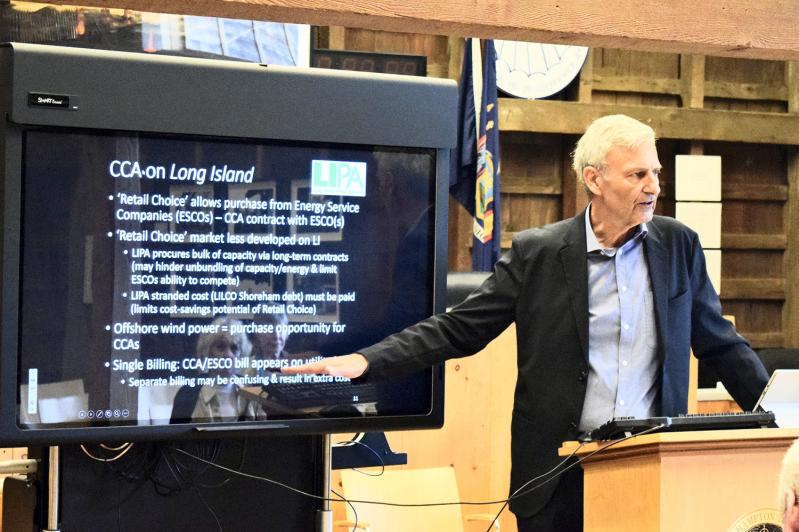The first of two forums on community choice aggregation, a model that replaces the utility as the default supplier of electricity or natural gas and gives municipalities the opportunity to seek lower prices from alternative suppliers, was held on Tuesday evening at East Hampton Town Hall.
The town is considering establishing a community choice aggregation, or C.C.A., model, in which it would purchase electricity on behalf of residents, businesses, and the town itself. One goal of such a program would be to ensure that a greater percentage of the town’s electricity comes from renewable sources.
That would be “a giant step forward” toward reaching the town’s goal of achieving all of its electricity from renewable sources, said Linda James, chairwoman of the town’s energy sustainability and resiliency committee.
This model, said Gordian Raacke, executive director of Renewable Energy Long Island, represents “an opportunity to change who decides where our power comes from.” The Long Island Power Authority would continue to deliver that power through its transmission and distribution infrastructure, he said, but its customers would select the means by which electricity is generated, or even build the energy source itself, such as a solar farm.
In short, a C.C.A. program would enable a faster shift to renewable energy sources and local control of electricity generation as well as offer cost savings through energy efficiency and bulk purchase programs for solar, battery storage, and even electric vehicles, Mr. Raacke said. It could also spur local jobs and renewable energy projects, while expanding customer choice.
There are presently four New York State Public Service Commission-approved C.C.A. plans serving 61 municipalities, Mr. Raacke said. But such a plan is only applicable to the service territories of private, investor-owned utilities; LIPA, as a state authority, is exempt from the regulations governing C.C.A.s and would have to adopt the rules and regulations of the Public Service Commission’s 2016 order authorizing a framework for a C.C.A. But, he said, LIPA has indicated that it would authorize C.C.A. programs and work with any municipality that wanted to institute such a program.
Should the town board decide to adopt legislation enabling a C.C.A. program, it will draft legislation, schedule a public hearing, and vote on a resolution to adopt it. It would then seek a C.C.A. administrator, which can be a municipality, a development corporation, a nonprofit organization, a private firm, or another third party. The administrator is tasked with developing and administering the program and procuring the energy for participating consumers, who are able to opt out.
Another forum on C.C.A. will happen on Monday at 6 p.m., also in the Town Hall meeting room.

